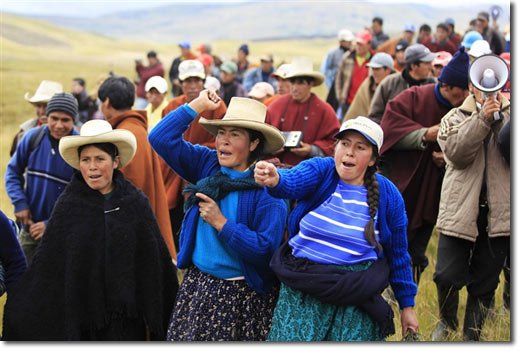
Back in 2009, Wikileaks released some diplomatic cables from the U.S. which revealeda list of priority countries for ‘GMO outreach’. Peru was amongst those on the hit list.
Well, now it seems Peru has opted out….
After public outcry when the nation’s former President — pro-GMO Alan Garcia — opened the door to GMOs and failed to action requests from the public to ban them, the new President, Ollanta Humala, has signed a GMO ban into law.
Peru’s Congress approves 10-year GMO ban
AGENCE FRANCE PRESSE, November 5 2011
LIMA – Peru’s Congress announced Friday it overwhelmingly approved a 10-year moratorium on imports of genetically modified organisms in order to safeguard the country’s biodiversity.
The measure bars GMOs – including seeds, livestock, and fish – from being imported for cultivation or to be raised locally.
Exceptions include the use of GMO products for research purposes in a closed environment, but those will be closely monitored, the legislature’s official news service said.
The bill, approved late Thursday, now goes to President Ollanta Humala to be signed into law. Humala, who has been in power since late July, has repeatedly said he opposes GM programs.
According to the Agriculture Ministry, Peru is one of the world’s leading exporters of organic food, including coffee and cocoa, with $3 billion a year in revenues and 40,000 certified producers.
Congress approved a similar 10-year moratorium in June, but outgoing president Alan Garcia, who was seen as being favorable to GM, did not ratify the ban.
There was friction over GM in the previous government’s ministries of agriculture and environment.
The head of Peru’s Consumer Agency, Jaime Delgado, said the moratorium is long enough to learn from scientific studies that will emerge on the effects of GMO products.
The country’s leading group representing farmers and ranchers, the National Agrarian Convention, said that by this measure Peru “defends its biodiversity, its agriculture, its gastronomy and its health.” —capitalfm.co.ke
I’d like to remind readers of a simple fact — that we don’t need GMOs! It’s well recognised that natural plant breeding techniques (which have been utilised by growers for millennia) produce improved, climate-specific varieties of plants much faster, and at almost no expense. This is in stark contrast to GMO laboratory work, which takes millions of dollars of research and many years of development — only to create a single strain, which is then expected to perform equally well (but they don’t) regardless of locale and regional conditions (so long as you use their recommended, costly chemicals, that is). GMOs are purely a ’solution’ looking for a problem — and all for the pure financial self-interest of bio-copyright claimants (nature privatisers), who are taking the aggregated work of farmers over the course of agricultural history, and making it their own.
Genetic modification actually cuts the productivity of crops, an authoritative new study shows, undermining repeated claims that a switch to the controversial technology is needed to solve the growing world food crisis.
[...]
The Nebraska study suggested that two factors are at work. First, it takes time to modify a plant and, while this is being done, better conventional ones are being developed. This is acknowledged even by the fervently pro-GM US Department of Agriculture, which has admitted that the time lag could lead to a "decrease" in yields.
But the fact that GM crops did worse than their near-identical non-GM counterparts suggest that a second factor is also at work, and that the very process of modification depresses productivity. The new Kansas study both confirms this and suggests how it is happening. — The Independent(emphasis added)
More and more countries are looking to protect their natural biodiversity and increase their economic resilience by avoiding GMO crops. I look forward to the day when Monsanto, Bayer, Syngenta and the like, all close up shop….




No comments:
Post a Comment